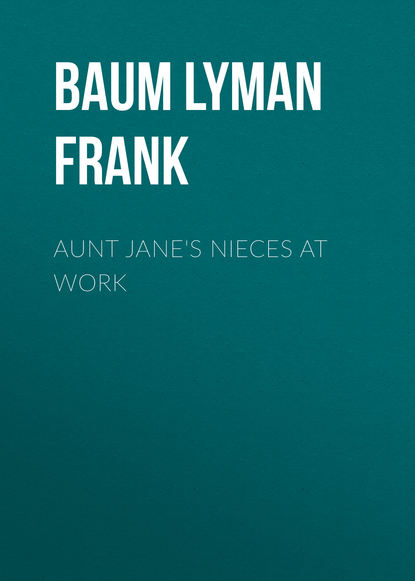По всем вопросам обращайтесь на: info@litportal.ru
(©) 2003-2024.
✖
Aunt Jane's Nieces at Work
Настройки чтения
Размер шрифта
Высота строк
Поля
"Very much, miss. She was a beautiful girl, everyone acknowledged. And it's all my fault – all my fault. I thought to save her, and drove her mad, instead!"
"You might have known that," declared Kenneth. "A girl of her character, sensitive to a fault, would be greatly shocked to find the man she loved a criminal."
"It was for her sake."
"That is a poor excuse. If you had waited Lucy would have proved her innocence."
"They threatened to arrest her, sir. It would have killed her."
"They wouldn't dare arrest her on suspicion."
"The Squierses would dare do anything. You don't know old Mrs. Squiers."
"I know the law, sir, and in any event it was a foolish thing, as well as criminal, to forge a check to get the money they demanded."
"You are right, sir," replied Tom Gates, despondently. "It was foolish and criminal. I wouldn't mind my own punishment, but it drove my Lucy mad."
"See here," said Kenneth, sternly, "you are getting morbid, young man, and pretty soon you'll be mad yourself. If Lucy is found do you want her to see you in this condition?"
"Can she be found, sir, do you think?"
"We are trying to find her," replied Kenneth. "You have failed, it seems, and Will Rogers had failed. I've had one of the cleverest detectives of Chicago trying to find her for the last three days."
"Oh, Kenneth!" exclaimed Beth. "I didn't know that. How good of you!"
"It must have been the detective that came to see Mrs. Rogers," said Tom, musingly. "She told me a strange man had been there from Mr. Forbes, to inquire all about Lucy."
"Yes; he makes a report to me every evening," remarked Kenneth; "and Mr. Burke says this is the most mystifying case he has ever encountered. So far there isn't a clew to follow. But you may rest assured that what any man can do, Burke will do."
"I'm so grateful, sir!" said Tom.
"Then you must show it by being a man, and not by giving way to your trouble in this foolish manner."
"I'll try, sir, now that there's something to hope for."
"There's a good deal to hope for. Despair won't help you. You must go to work."
"I will. It won't be very easy to get work, for I've disgraced myself in this neighborhood, and I can't leave here till something is known of Lucy's fate. But I'll do something – any kind of work – if I can get it."
"I need someone to assist me in my correspondence," said Kenneth. "Would you like to be my secretary?"
"Me, Mr. Forbes – me!"
"Yes, Tom. I'll pay you twenty dollars a week to start with, and more if you serve me faithfully. And you'll board here, of course."
Then Tom Gates broke down and began to cry like a child, although he tried hard to control himself.
"You – you must forgive me, Mr. Forbes," he said, penitently; "I – I've been without sleep for so long that I haven't any nerves left."
"Then you must go to sleep now, and get a good rest." He turned to Beth. "Will you see Martha," he asked, "and have her give Tom Gates a room?"
She went on her errand at once, and gradually the young man recovered his composure.
"I can do typewriting and stenography, Mr. Forbes," he said, "and I can keep accounts. I'll serve you faithfully, sir."
"We'll talk of all this by and by, Tom," replied Kenneth, kindly. "Just now you must have some sleep and get your strength back. And don't worry about Lucy. Burke will do everything that can be done, and I am confident he will be able to trace the girl in time."
"Thank you, sir."
Then he followed the butler away to his room, and after the girls had discussed him and expressed their sympathy for the unfortunate fellow, they all turned their attention to the important matter of the campaign. The debate with Hopkins was the thing that occupied them just now, and when Patsy joined the group of workers they began to discuss some means of scoring a decisive victory at the Fairview Opera House. The Honorable Erastus still insisted upon making the anti-sign fight the prominent issue of the campaign, and they must reply forcibly to the misleading statements made in his last hand-bill.
Meantime Tom Gates was sunk in the deep sleep of physical exhaustion, and the day wore away before he wakened. When at last he regained consciousness he found the sun sinking in the west and feared he had been guilty of indiscretion. He remembered that he was Mr. Forbes's secretary now, and that Mr. Forbes might want him. He was not yet thoroughly rested, but night was approaching and he reflected that he could obtain all the sleep that he needed then.
So, greatly refreshed, and in a quieter mood than he had been for days, the young man dressed and entered the hall to find his way downstairs.
It happened that Beth, whose room was near this rear corridor, had just gone there to dress for dinner, and as she was closing her door she heard a wild, impassioned cry:
"Lucy!"
Quickly she sprang out into the hall and turned the corner in time to see a strange tableau.
Young Gates was standing with his arms outstretched toward Eliza Parsons, who, a few paces away, had her back to the door of her own chamber, from which she had evidently just stepped. She stood motionless, looking curiously at the youth who confronted her.
"Lucy! don't you know me?" he asked, his voice trembling with emotion.
"To begin with," said the girl, composedly, "my name happens to be Eliza. And as we've not been properly introduced I really don't see why I should know you," she added, with a light laugh.
Tom Gates shrank away from her as if he had been struck.
"You can't be Lucy!" he murmured. "And yet – and yet – oh, you must be Lucy! You must know me! Look at me, dear – I'm Tom. I'm your own Tom, Lucy!"
"It's very gratifying, I'm sure, young man," said the girl, a touch of scorn in her tones. "If you're my own Tom you'll perhaps stand out of my way and let me go to my work."
Without another word he backed up again; the wall and permitted her to sweep by him, which she did with a gesture of disdain.
When Eliza Parsons had disappeared down the back stairs Beth drew a long breath and approached Tom Gates, who still stood by the wall staring at the place where the girl had disappeared.
"I overheard," said Beth. "Tell me, Tom, is she really like Lucy?"
He looked at her with a dazed expression, as if he scarcely comprehended her words.
"Could you have been mistaken?" persisted the questioner.
He passed his hand over his eyes and gave a shudder.
"Either it was Lucy or her ghost," he muttered.
"Eliza Parsons is no ghost," declared Beth. "She's one of the maids here at Elmhurst, and you're quite likely to see her again."

















